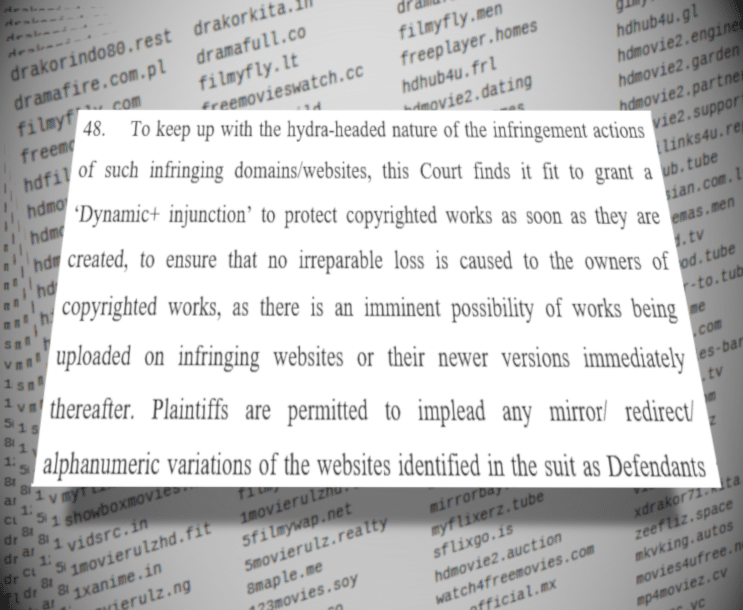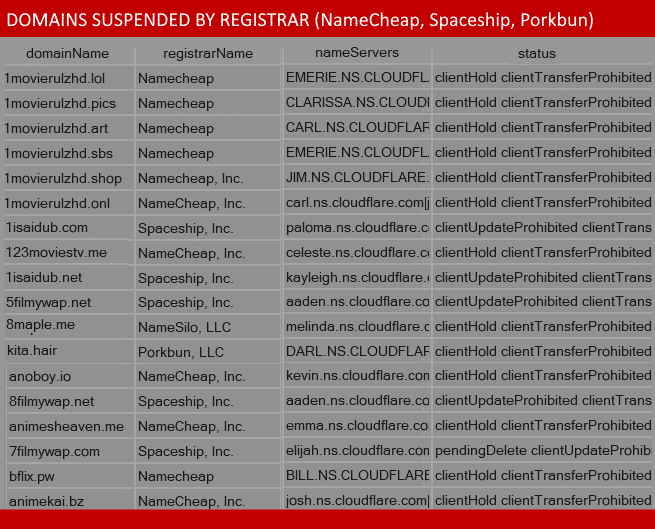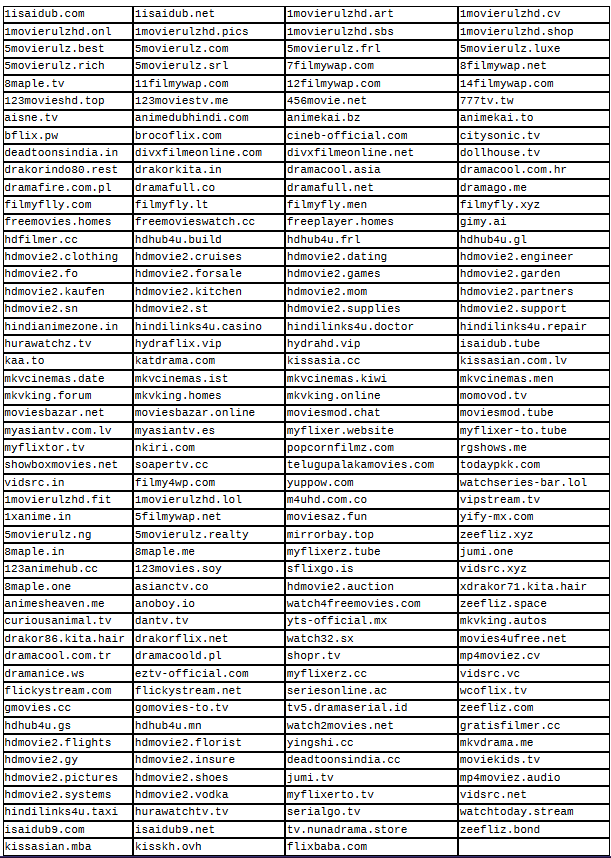 The Motion Picture Association’s (MPA) submission to the USTR’s 2025 review of notorious pirate markets identifies a “rapidly expanding” category of pirate sites.
The Motion Picture Association’s (MPA) submission to the USTR’s 2025 review of notorious pirate markets identifies a “rapidly expanding” category of pirate sites.
Calling out the likes of Vidsrc, HydraHD, and Cineby, the MPA spoke of “one-stop piracy sites offering content somewhat comparable to IPTV services, but without the need for subscriptions or dedicated devices.”
The MPA’s use of the term ‘hydra’ appears to acknowledge that sites operating in this category have a tendency to respawn and multiply in response to site blocking measures. That could mean switching to backup domains or, if necessary, entirely new branding. With reappearances as inevitable as the next wave in Space Invaders, it would take something special to turn the tide.
Slaying the Hydra
In this context, the term ‘hydra’ was popularized by The Pirate Bay, but it’s been capturing imaginations in Indian courts for years. Attorneys and judges alike continuously decry the menace of “hydra-headed websites” and the urgent need to shut them down.
In June, Disney subsidiary Star India obtained a so-called ‘superlative injunction‘ consisting of a rapid domain blocking mechanism locally, and a domain suspension component completely unrestricted by Indian borders.
Since blocked domains can continue to provide access to a site, measures that put them completely out of action are valuable. Domain suspensions and seizures are technically possible under civil law in the United States, but time and expense render them completely impractical.
Yet, Star India was able to issue orders to U.S. domain registrars and have domains permanently suspended in a matter of days. It was only ever a question of time before Western rightsholders used Indian courts to ease both local and international problems, and that moment has just arrived.
Universal City Studios Productions LLLP vs. Isaidub.spot
The aim of a blocking injunction handed down by the High Court of Delhi in late September isn’t in doubt, but the absence of fundamental details at the start means a few assumptions have to be made.
With its name in the title of the case, Universal City Studios is clearly the first plaintiff, but the names of the others go completely unmentioned in the order. Justice Manmeet Pritam Singh Arora introduces the first six plaintiffs as “members of the MPA and/or the Alliance for Creativity and Entertainment,” but as organizations, neither has any standing to sue. The originating complaint does not appear to have been made public.
Plaintiffs 7, 8 and 9 are described as “members of Copyright Overseas Promotion Association (‘COA’).” COA is a South Korean anti-piracy coalition that counts Kakao and Naver Webtoon among its members but the names of the plaintiffs here go unmentioned here too.
Japanese anime producer Toho Co. Ltd. is mentioned by name as the owner of copyrighted content for which Plaintiff No. 6 is the exclusive distributor in India. Under India’s Copyright Act, Toho is actually listed as a defendant, while the name of the exclusive distributor, which does have standing to sue, remains a mystery.
106 Rogue Sites and 248 Domains to Get Things Going
As a group, a total of nine plaintiffs requested and obtained a permanent injunction against 106 ‘rogue’ websites, operating from 248 domains. The injunction restrains the operators of those sites from infringing the plaintiffs’ exclusive rights by making their content available online without appropriate licensing.
The list of ‘rogue’ sites contains several large piracy platforms such as Vidsrc, HydraHD, and Cineby, all of which the MPA directly links to ‘hydra-like’ activity.
On September 10, all sites named in the complaint were sent takedown notices but just one site responded. The operator of mp4moviez.villas said the site “merely indexes and organizes content which is publicly made available.” Many streaming sites carry a similar disclaimer, presumably in the mistaken belief it helps on the legal front.
Mp4moviez.villas rendered any argument moot by ignoring the takedown notice.
The Injunction
The scope of the injunction sits fairly quietly in the details but is nevertheless comprehensive. With no requirement for the live aspects of a ‘superlative’ injunction, it’s a dynamic+ variant with two key components – blocking and domain suspensions.
The domains listed in the order are all subject to blocking by local ISPs. Measures to block the usual mirrors, redirects, proxies and similar platforms are included and, by now, fairly standard practice.

The injunction takes a particularly broad view of how sites not named in the injunction can be considered within its scope. Any mirror/redirect/alphanumeric website which appears to be associated with any of the named websites either based on its name, branding, the identity of its operator, or source of the content it uses.
How many of the existing 248 domains use the same content sources would take time to establish, but if just 10% had truly distinct sources, that wouldn’t come as a surprise. In the wider world that doesn’t bode well for the hundreds of sites that are easily identified as using the same source, or even for those that simply appear to be using the same source.
In practical terms, site operators are effectively powerless because the rules are deliberately wide for obvious reasons. If Hollywood has ‘Six Degrees of Kevin Bacon‘ the rules here for pirate streaming sites likely reduce their variant to three or less. Depending on how the rules are interpreted, this list alone could be sufficient to encompass a very large portion of the overall market.
Domain Suspensions
The above rules apply to ISP blocking in India, which instantly covers 248 domains and could easily cover 5000 more in very little time at all. That the rules also apply to domains that domain registrars in the United States and elsewhere are expected to suspend is very significant indeed. Even more so considering that big name registrars are already complying with these foreign court orders.
The image below shows just a few of the domains already put out of action by NameCheap, Spaceship, NameSilo and Porkbun, in all cases using the domain status ‘clientHold’.

Early checks suggest maybe four dozen suspensions on this ground alone, but losing a cheap domain is only the beginning.
Domain name registrars are “directed to lock and suspend” the domains and provide the plaintiffs with details they hold relating to the registrants, including “Know Your Customer” information, plus credit card and mobile phone details, within 72 hours of receiving the order.
Overall, the order is a prime example of how powerful tools become available after a series of patient, incremental steps.
Depending on the volume of suspensions moving forward, there may even be implications for site-blocking proposals in the United States. With the right groundwork to ensure major platforms are continuously within the scope of this type of injunction, domains could be suspended more quickly than the time taken to block them.
The full list of domains is available in the linked order, with the majority also shown in the table below.
Universal City Studios Productions LLLP vs. Isaidub.spot blocking order here (pdf)

From: TF, for the latest news on copyright battles, piracy and more.
Powered by WPeMatico
